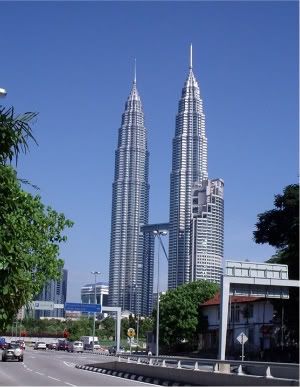Wan Saiful Wan Jan
Wan Saiful Wan Jan is chief executive of the Institute for Democracy and Economic Affairs, a think tank based in Malaysia.

Petronas Twin Towers - a symbol of Kuala Lumpur's prosperity
February 8th is the birthday of the man who not only peacefully negotiated for Malaysia’s liberty in 1957, but also for creating the Federation of Malaysia in 1963. Almarhum Tunku Abdul Rahman Putra Alhaj would have been 108 this Tuesday. The man is greatly missed.
As an organisation inspired by his vision to see Malaysia remain “for ever a sovereign democratic and independent State founded upon the principles of liberty and justice”, the Institute for Democracy and Economic Affairs chose the same date last year for our official launch.
And this year, on the birthday of Bapa Merdeka and Bapa Malaysia, we too will celebrate our birthday. Thanks to Arkib Negara’s kind support, we will once again congregate at the Memorial Tunku Abdul Rahman Putra, Kuala Lumpur, this Tuesday morning to celebrate the day.
Last year at our launch, Tengku Razaleigh Hamzah, Tunku’s close friend, spoke about his admiration of the man. This year, another friend of Tunku’s, Tan Sri Kadir Sheikh Fadzir will remind us what a jovial and fun-living man Tunku was.
We also have an impressive line up of speakers who will debate about our country’s economic trajectory vis a vis Almarhum Tunku’s vision for the country. They are Dato’ Sri Idris Jala (PEMANDU), Datuk Dr Zainal Aznam Yusof (National Economic Advisory Council, NEAC), Tengku Dato’ Zafrul Aziz (Maybank IB), and Woon King Chai (student leader). Almarhum Tunku’s family members will grace the event with their attendance.
Our country is now undergoing a big change. The NEM envisions a high income, sustainable and inclusive economy by 2020. Eight strategic reform initiatives are outlined to propel the Malaysia economy, most of which are aimed at creating a more liberalised and open markets.
The ETP further elaborates on the steps needed to make our country a high income nation. Twelve NKEAs have been identified, complete with 131 entry point projects. All are aimed at increasing our gross national income.
Both the NEM and ETP emphasise the importance of the private sector in transforming the Malaysia economy. Again and again, they talk about the need to make the Malaysia economy private-sector driven. The NEM was actually quite explicit on the need to rationalise government’s involvement in business.
Almarhum Tunku once said “I have always maintained that the Government must not indulge in business. This must be left to the business community. There are many losses incurred by the Government of late and this should be a good lesson to our leaders not to mix politics with business.”
To “rationalise” the government’s involvement in business is a very woolly description of what needs to be done. What the government really needs to do is to step out completely from running or controlling enterprises. The mixing of government political agenda with business activities distorts the market because the government has the power to favour entities related to them, thereby discriminating against true entrepreneurs.
The continued presence of government in business also creates a situation where these pseudo-business entities become tools of their political masters. This is happening in Malaysia today, and it is so blatant. For example, a politician who was suspended for money-politics by his own party – Isa Samad – is now chairman of Felda, one of the biggest agro-based GLCs, whose settlers are traditional UMNO voters.
I really don’t know what sign the Malaysia government is trying to give through this appointment. At a time when the ruling party is worried about their vote among Felda settlers, is the government implying that “something” needs to be done to win back those votes, and Isa Samad has proven he knows how to do it?
Even Tun Mahathir once disagreed with the way UMNO deals with Isa Samad, arguing that by putting him as candidate in Bagan Pinang, the party looks like they are not serious in tackling political corruption.
This kind of politicisation can only happen when companies are directly linked or owned by the government. In other words, this can only happen when companies are or remain nationalised.
Almarhum Tunku in his usual wisdom once said: “There is a section of the people who advocate nationalising certain businesses and industries. But as long as the Alliance remains in power such concepts will not be put into practice because we do not believe such measures will benefit our economy.”
And this is why I am excited by Dato’ Sri Najib’s attempt to reform the Malaysia economy. I do have reservations about how these ideas are being or will be implemented. But the spirit of free market capitalism behind the initiatives are, simply, brilliant. We must now focus on getting the implementation right, so that the true spirit behind the reforms can be realised.
In implementing the reforms, government should welcome constructive criticisms. At the same time critics should do so to build and improve, not to destroy (unless necessary, of course). Our debate on 8 February is certainly designed to build and improve. More importantly, we also want to reinvigorate the vision of Malaysia’s founding fathers, especially Tunku Abdul Rahman. The event is free and open to the public. Just let us know if you want to come so that we can prepare sufficient food for lunch!

